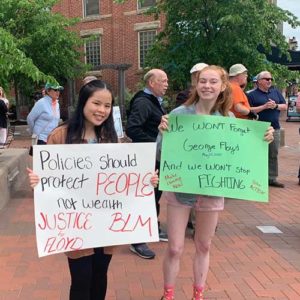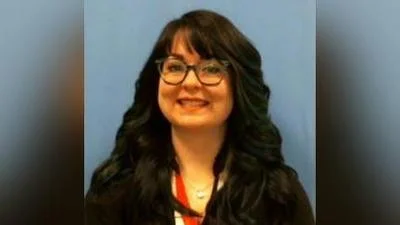Today marks two years since the murder of George Floyd, which precipitated one of the largest racial justice movements in American history.
Since June 1, 2020, Désirée Weber, assistant professor of political science, has been leading daily protests on issues of racial justice in downtown Wooster and facilitating biweekly policy meetings with relevant agencies through the Wayne County Racial Justice Coalition. Founded by Weber, the Coalition is a volunteer-run organization that consists of members of the Wooster community with a mission of eradicating individual and structural racism in the communities of Wayne County, Ohio.
After several meetings and thoughtful discussions between Weber, other members of the coalition, Wooster/Orrville NAACP, concerned citizen Scott Myers, and members of the Wooster Police Department (WPD) administration, the WPD announced it is amending its existing policies on chokeholds, carotid control holds, and no-knock warrants to better reflect and clarify these practices in its policy manual.
“During these meetings it became clear that in practice, the Wooster Police Department rarely if ever relied on the techniques in question,” explained Weber. “However, the conversations led to changes in written policy to better reflect and clarify these practices in the Wooster Police Department policy manual.”
These local policy changes come against a backdrop of the Black Lives Matter Movement across the country. The 2020 police killings of George Floyd on May 25 in Minneapolis, Minnesota, and Breonna Taylor on March 13 in Louisville, Kentucky, brought scrutiny to the use of chokeholds and no-knock warrants. These and other instances of police misconduct precipitated one of the largest protest movements in U.S. history.
 Matt Fisher ’95, chief of police in Wooster, hopes that this can be an example to others of the positive outcomes that can be reached through dialogue, conversations, and working together, even when people might disagree. “Members of the coalition have been thoughtful and understanding about the difficult job law enforcement has today. Everyone at our meeting was willing to listen, consider a different perspective, and work towards a common goal of making Wooster, Ohio, safe for residents and law enforcement officers,” he said.
Matt Fisher ’95, chief of police in Wooster, hopes that this can be an example to others of the positive outcomes that can be reached through dialogue, conversations, and working together, even when people might disagree. “Members of the coalition have been thoughtful and understanding about the difficult job law enforcement has today. Everyone at our meeting was willing to listen, consider a different perspective, and work towards a common goal of making Wooster, Ohio, safe for residents and law enforcement officers,” he said.
Weber, who also chairs the Wooster/Orrville NAACP Political and Community Engagement Committee, believes these efforts can assist in further collaboration in the future. “Change can be difficult, but it is great to see these policy changes be implemented—especially because they are the result of open and genuinely collaborative work by law enforcement and community members,” she said. “These changes to the policies on chokeholds, carotid holds, and no-knock warrants not only make all members of the community safer, but I am confident that they will lead to further collaborative projects to make changes that will benefit everyone.”
In Wooster, the coalition members held daily demonstrations, now on day 724, in downtown Wooster starting on June 1, 2020. The coalition, in collaboration with the NAACP, also launched their “Wooster Safe for All” campaign to advocate for changes to WPD policies. On Feb. 9, 2022, after several collaborative discussions, the parties agreed on changes to bring policies in line with practices on the following issues:
- Chokeholds are now placed in the “use of deadly force” category, subject to the same restrictions as the use of deadly force using a gun, in line with federal executive order and state mandates
- Carotid control holds are now defined in the manual for the first time and also placed in the “use of deadly force” category
- No-knock warrants: the manual now articulates that the default policy is to seek “knock and announce” warrants and daytime warrants, and increases the standard for facts or circumstances that may justify seeking a no-knock warrant, and requires these to be set forth in an affidavit submitted to the court
Rick Helmuth, retired attorney and member of the Wooster/Orrville NAACP and the Coalition, credits the daily demonstrators of the coalition and the WPD for identifying and thoughtfully discussing these issues. “The policy changes made by the WPD regarding chokeholds, carotid control holds, and no-knock warrants are commendable. These initiatives make Wooster safer for all—its citizens and police officers—without compromising the important work of law enforcement,” he said.
Scott Myers, concerned citizen, attended some Racial Justice Coalition meetings and reviewed their five policy goals. “With the knowledge that these issues represent tragic headlines in national news, I felt grateful to live in the Wooster community. I then reached out to the Wooster Police Department to learn how the practices of our law enforcement officers aligned with these policy goals. I was pleased to learn that the day-to-day activities, training, and practices, were consistent with these five policy goals.”
Scott Rotolo, assistant chief of police, believes this process served as an opportunity for the WPD to strengthen its relationship with the community they serve and “there’s no question that we all got to know one another a little better.” He added, “Our conversations were, open, honest, and transparent. We discussed a few specific polices, talked about how we do business, and had meaningful discussions we can all be proud of.”
For more information, visit the following websites:
Wayne County Racial Justice Coalition
Original source can be found here.


 Alerts Sign-up
Alerts Sign-up